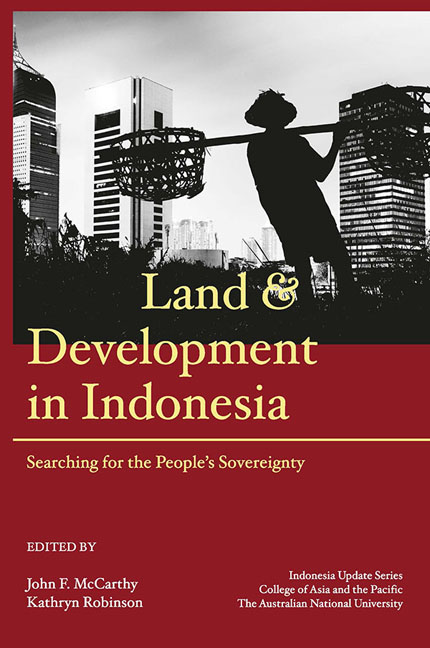Book contents
- Frontmatter
- Contents
- Tables
- Figures
- Contributors
- Acknowledgements
- Glossary
- Map
- 1 Land, economic development, social justice and environmental management in Indonesia: the search for the people's sovereignty
- PART 1 LAND USE AND LAND LAW: THE BIG PICTURE
- PART 2 ENVIRONMENTAL AND CUSTOMARY FRAMING OF LAND TENURE
- PART 3 URBAN AND INFRASTRUCTURE DEVELOPMENT
- PART 4 AGRICULTURE, LAND TENURE AND LIVELIHOODS
- PART 5 LARGE-SCALE LAND ACQUISITIONS AND SMALLHOLDER DEVELOPMENT
- 13 Industrial plantations and community rights: conflicts and solutions
- 14 How can the people's sovereignty be achieved in the oil palm sector? Is the plantation model shifting in favour of smallholders?
- 15 Beyond special autonomy and customary land rights recognition: examining land negotiations and the production of vulnerabilities in Papua
- Index
- Miscellaneous Endmatter
15 - Beyond special autonomy and customary land rights recognition: examining land negotiations and the production of vulnerabilities in Papua
from PART 5 - LARGE-SCALE LAND ACQUISITIONS AND SMALLHOLDER DEVELOPMENT
Published online by Cambridge University Press: 29 July 2017
- Frontmatter
- Contents
- Tables
- Figures
- Contributors
- Acknowledgements
- Glossary
- Map
- 1 Land, economic development, social justice and environmental management in Indonesia: the search for the people's sovereignty
- PART 1 LAND USE AND LAND LAW: THE BIG PICTURE
- PART 2 ENVIRONMENTAL AND CUSTOMARY FRAMING OF LAND TENURE
- PART 3 URBAN AND INFRASTRUCTURE DEVELOPMENT
- PART 4 AGRICULTURE, LAND TENURE AND LIVELIHOODS
- PART 5 LARGE-SCALE LAND ACQUISITIONS AND SMALLHOLDER DEVELOPMENT
- 13 Industrial plantations and community rights: conflicts and solutions
- 14 How can the people's sovereignty be achieved in the oil palm sector? Is the plantation model shifting in favour of smallholders?
- 15 Beyond special autonomy and customary land rights recognition: examining land negotiations and the production of vulnerabilities in Papua
- Index
- Miscellaneous Endmatter
Summary
The growing international rush for land by both state and private investors, which has accelerated since the global food price crisis of 2007–08, has raised concerns about the well–being—and survival—of people who depend on the land for their food security, community cohesion and livelihoods (Narula 2013). Opinions differ on the extent to which national law and international standards on human rights or resettlement safeguards can protect such people given the overwhelming power dynamics at play in land negotiations and land transfer in the context of escalating global competition for control of land (see Chapters 4 and 13 of this volume). Without formal legal or legalisable title to land, such people often face daunting odds in negotiating their futures with powerful investors and developers backed by state interests and sharp legal advisors making use of complex land transfer mechanisms (Cotula et al. 2009, 2011). In other cases, even having legal title does not necessarily ensure the future well-being of landowners. In the post-agrarian reform situation in the Philippines, for example, the granting of land titles over customary lands has facilitated land transfer but not welfare transfer (Borras 2001, 2006; Gutierrez and Borras 2004).
Cotula et al. (2009: 7) identify two factors that may influence the extent to which the presence or absence of land title can lead to socio-economic insecurity. First, significant gaps between written law and the reality on the ground may result in major costs being internalised by local people and make it difficult for investor companies to deal with the consequent local tensions. Second, an absence of legal or procedural mechanisms to protect local rights and take account of local interests, livelihoods and welfare leaves local people vulnerable. In this chapter we examine the complexities of these factors within a context of escalating pressure for large-scale land investment and a lack of formal, legal forms of land and resource tenure for customary landowners in Papua, Indonesia.
We use the Merauke Integrated Food and Energy Estate as a case to exemplify the large-scale resource extraction projects that have been designed and implemented in Papua with the goal of establishing peace through economic development. This idea of large-scale investment to create peace and economic development in Papua dates back to 1967, when the first contract with the Freeport-McMoRan resource extraction company was signed.
- Type
- Chapter
- Information
- Land and Development in IndonesiaSearching for the People's Sovereignty, pp. 343 - 362Publisher: ISEAS–Yusof Ishak InstitutePrint publication year: 2016

